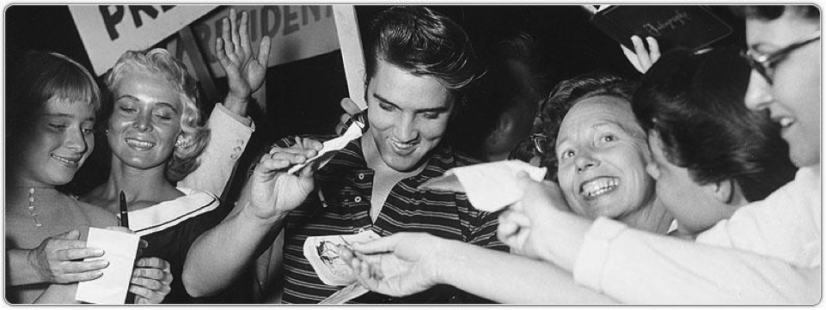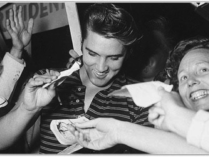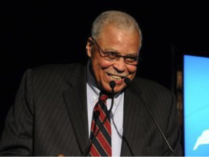THE PERSUASIVE WORD
WHAT DOES THE ROCKSTAR PHENOMENON & PUBLIC SPEAKING HAVE IN COMMON?
February 17, 2019
Humans are affected by the ‘Rockstar’ phenomenon. Crowds rush to see their favorite singers, actors, or bands. We secretly want to be the person up on stage. The person attracting all that attention, those accolades, and the adoring fans. These days we idolize a participant on a reality TV program and attribute ‘rockstar’ qualities to these normal, everyday people. When asked what they want to be when they grow up, young people answer “famous”. It’s the ‘rockstar’ quality they crave because then thousands and maybe millions will love them.
Very few of us live as hermits. Basic psychology says we all need validation by others. Yet the mass validation that we readily give to celebrities is not only an important phenomenon – it relates to our desire to be great public speakers.
Evolutionary Psychology provides some answers.

Much as we like to think of ourselves as highly developed beings, most of our behavior relates to displaying how strong we are from a reproductive point-of-view. Public Performance of any type provides us with an excellent opportunity for what evolutionary psychology calls ‘genetic signaling’. When young children ‘play’ they often ‘show off’. This is not by chance. The purpose of play is to show off our genetic fitness. The implication is ‘look how strong I am – you’d better not mess with me’. Or ‘look how strong I am – I would be an excellent mate for you’.
As humans develop into adults we don’t stop playing. The game simply becomes more serious with greater consequences. We call it ‘work’ or ‘art’ or ‘creativity’. Many become extreme ‘show offs’ in the interest of building personal power as perceived by others. Humans are particularly attuned to athletic, musical or verbal performance. Hence, the massive following of sporting heroes, musical stars, and yes – public speaking ‘stars’. Becoming the ‘Rockstar’ on stage is the ultimate validation of our power. “If all of those people like or validate me, I must be pretty fabulous!”
An excellent Public Performance feels good for the performer. The performer’s brain receives a satisfying dose of dopamine and the more we are given the chance to ‘show off’, the more dopamine we receive. An excellent public performance also feels good for the audience but for different reasons. We feel wonderful when witnessing an exceptional performance. Why?
First, psychology tells us that humans imitate each other far more than any other species. It therefore follows that we are going to be keen to witness a spectacular performance of any kind so that we might, in some way, copy it, thus becoming more impressive from a genetic ability perspective. So much has been written about ‘Leadership’ but followers simply want to follow a leader they can look up to and emulate. This admiration is a spectrum that runs from simply admiring the Leader to investing an emotional connection in him or her so that the follower will ‘do anything for that leader’.
History is full of such examples and we occasionally see this type of reverie and dedication to CEOs today. I am not talking about the power that comes from someone who has developed a ground-breaking product such as Elon Musk of Tesla, I am referring to the power and attraction of a Leader who attracts admiration by the force of their personality, warmth and willingness to share something of themselves with their followers. When this occurs, followers ‘relate’ and an attachment is made based upon admiration. We all know that humans are attracted to other humans who they ‘like’. But we cannot ‘like’ a person if we don’t know something of them. In large organizations, public speaking events provide the CEO with a platform to show his or her followers that they are firstly ‘likeable’ and secondly ‘admirable’.
Second, Evolutionary Psychology theory tells us that humans are socially linked to the performer. We feel stronger by association, and thus better able to produce stronger children. There are countless examples of crowds who dress like the performer and even attempt to imitate the performer’s behaviors such as The Harry Potter fan-base, attendees of Comicon and even product announcements by Apple especially those that were delivered by Steve Jobs. We crave the power these performers have.
Third, the more we immerse ourselves in adoring behavior towards the performer, the more we may earn their approval and, taken to the ultimate conclusion, earn the chance to mate with the performer and produce superior children. Hence, the phenomenon of the ‘groupie’.
All of these explanations are plausible. They provide an explanation of the rockstar phenomenon – the secret wish within all of us to become that ‘Rockstar’.
Public Speaking provides a fairly fast track to becoming a ‘Rockstar’. To stand in front of an audience and lead them mentally and emotionally wherever we want is a satisfying experience for the public speaker. But it also carries a responsibility. I am critical of many contemporary speakers who do not appear to have considered the impact their words can have on someone’s life and well-being. The impact can be positive and motivational, or it can be destructive and misleading. Speeches have started wars, but they have also healed the sick and moved millions to act for the betterment of mankind.
Regardless of all the above, receiving accolades from our audience for our speaking performance simply tells us that we are superior in our abilities since the rest of humanity would rather be dead than step in front of that audience.
Are you ready to become a rockstar public speaker?
OTHER RECENT ARTICLES



